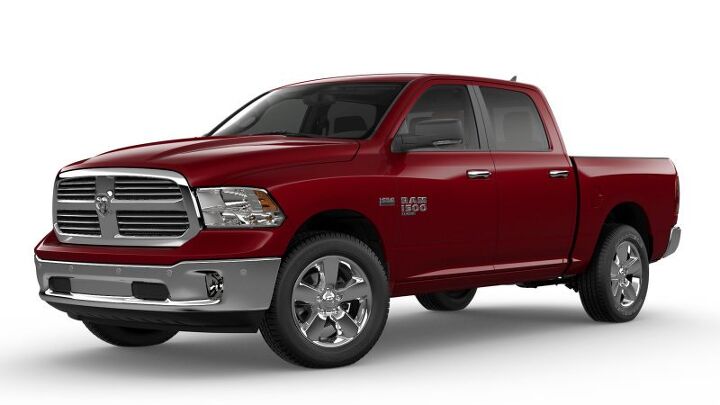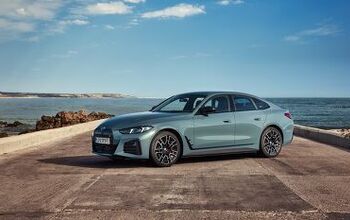In With the Old: 2019 Ram 1500 Classic Joins New Model to Energize Sales

In 1985, the Coca-Cola Company replaced the original formula of its flagship soft drink and called the beverage “New Coke.” The new label was tucked into the corner, as this was to become the brand’s staple flavor. But the soda company knew better than to gamble its business on an unproven taste, so it retained the old formula and bottled it as “Coca-Cola Classic.” The end result was more sales and a safety net for those unwilling to steer their taste buds into adventure.
Fiat Chrysler Automobiles is doing the same thing with the Ram brand. The full-size 1500 pickup truck was replaced for the 2019 model year. However, FCA wanted to keep both the fourth and fifth generations of the half-ton hauler on the books.
Since Ram can’t call them both the 1500 and hope people recognize the difference, it’s appending the older model with the Classic nameplate. The brand will offer both the 2019 Ram 1500 Classic, known internally as the DS model, and the all-new 2019 Ram 1500, marked as the DT, at all North American dealers through the 2018 calendar year.
“As we launch the all-new 2019 Ram 1500, we didn’t want to walk away from a key part of the light-duty truck market,” said Mike Manley, head of the truck brand. “Ram will continue to produce the 1500 Classic targeted at entry and commercial buyers.”
Alright, so why is FCA really doing this? The Coke strategy could play a factor. By offering both the DS and DT, Fiat Chrysler can flood the extremely popular pickup market with two full-sized models. But that’s not the only reason FCA might have to keep the older vehicle around.
As of last week, examples of the new 1500 were limited to models equipped with the 5.7-liter Hemi. The Environmental Protection Agency has been slow to grant approval to the brand’s mild-hybrid powertrains — which include the Hemi and a 3.6-liter V6. Strangely, neither FCA or the EPA have specified why.
Keeping the older model around will buy Ram some time as those approvals go through and production has a chance to catch up. For 2019, the Ram 1500 Classic is offered in four trims: Tradesman, Express, Big Horn/Lone Star and Special Services Vehicle (SSV). The Classic also benefits from three new packages, bundled in a comprehensive way to minimize overall costs and assembly headaches.
For example, the Chrome Plus package available on the Tradesman adds all the shiny bits you can handle, along with keyless entry. The Tradesman SXT slaps dual exhaust ports on V8 models, fog lamps, 20-inch chrome wheels, and a upsized center console. An Express Black Accent Package is offered on all Express trim exterior colors but adds black wheels and badging.
The 3.6-liter V6 and 5.7-liter V8 carry over, but a new 3.0-liter V6 EcoDiesel is said to become available at a later date. Bed sizes and cab configurations are enough to satisfy anyone’s needs and the price difference is enough to keep buyers interested in the older model. If you found a build you liked on the old pickup, you’ll surely be happy with the new-old truck.
Currently, the fourth-generation 1500 starts at $27,295, undercutting the new base model by $4,400 (which you can order by not own). It won’t officially become the Classic until the final quarter of 2018, by which time the EPA may have approved those mild-hybrid powertrains.
[Image: FCA]

A staunch consumer advocate tracking industry trends and regulation. Before joining TTAC, Matt spent a decade working for marketing and research firms based in NYC. Clients included several of the world’s largest automakers, global tire brands, and aftermarket part suppliers. Dissatisfied with the corporate world and resentful of having to wear suits everyday, he pivoted to writing about cars. Since then, that man has become an ardent supporter of the right-to-repair movement, been interviewed on the auto industry by national radio broadcasts, driven more rental cars than anyone ever should, participated in amateur rallying events, and received the requisite minimum training as sanctioned by the SCCA. Handy with a wrench, Matt grew up surrounded by Detroit auto workers and managed to get a pizza delivery job before he was legally eligible. He later found himself driving box trucks through Manhattan, guaranteeing future sympathy for actual truckers. He continues to conduct research pertaining to the automotive sector as an independent contractor and has since moved back to his native Michigan, closer to where the cars are born. A contrarian, Matt claims to prefer understeer — stating that front and all-wheel drive vehicles cater best to his driving style.
More by Matt Posky
Latest Car Reviews
Read moreLatest Product Reviews
Read moreRecent Comments
- MacTassos Bagpipes. And loud ones at that.Bagpipes for back up warning sounds.Bagpipes for horns.Bagpipes for yellow light warning alert and louder bagpipes for red light warnings.Bagpipes for drowsy driver alerts.Bagpipes for using your phone while driving.Bagpipes for following too close.Bagpipes for drifting out of your lane.Bagpipes for turning without signaling.Bagpipes for warning your lights are off when driving at night.Bagpipes for not coming to a complete stop at a stop sign.Bagpipes for seat belts not buckled.Bagpipes for leaving the iron on when going on vacation. I’ll ne’er make that mistake agin’.
- TheEndlessEnigma I would mandate the elimination of all autonomous driving tech in automobiles. And specifically for GM....sorry....gm....I would mandate On Star be offered as an option only.Not quite the question you asked but.....you asked.
- MaintenanceCosts There's not a lot of meat to this (or to an argument in the opposite direction) without some data comparing the respective frequency of "good" activations that prevent a collision and false alarms. The studies I see show between 25% and 40% reduction in rear-end crashes where AEB is installed, so we have one side of that equation, but there doesn't seem to be much if any data out there on the frequency of false activations, especially false activations that cause a collision.
- Zerocred Automatic emergency braking scared the hell out of me. I was coming up on a line of stopped cars that the Jeep (Grand Cherokee) thought was too fast and it blared out an incredibly loud warbling sound while applying the brakes. I had the car under control and wasn’t in danger of hitting anything. It was one of those ‘wtf just happened’ moments.I like adaptive cruise control, the backup camera and the warning about approaching emergency vehicles. I’m ambivalent about rear cross traffic alert and all the different tones if it thinks I’m too close to anything. I turned off lane keep assist, auto start-stop, emergency backup stop. The Jeep also has automatic parking (parallel and back in), which I’ve never used.
- MaintenanceCosts Mandatory speed limiters.Flame away - I'm well aware this is the most unpopular opinion on the internet - but the overwhelming majority of the driving population has not proven itself even close to capable of managing unlimited vehicles, and it's time to start dealing with it.Three important mitigations have to be in place:(1) They give 10 mph grace on non-limited-access roads and 15-20 on limited-access roads. The goal is not exact compliance but stopping extreme speeding.(2) They work entirely locally, except for downloading speed limit data for large map segments (too large to identify with any precision where the driver is). Neither location nor speed data is ever uploaded.(3) They don't enforce on private property, only on public roadways. Race your track cars to your heart's content.


































Comments
Join the conversation
Looking at them side by side at the dealer the new truck is handsome enough other than the stupid emblem on the hood now. I would by an aftermarket hood just to get rid of it and have all the new refinements. Or, in this case maybe buy the classic because they are pretty sharp and give up the chenges. Should I need to buy a truck, which I don't.
I went to a FCA dealer the other day and could not see one appealing vehicle. Ok, the Hellcat and a few other muscles cars are interesting.